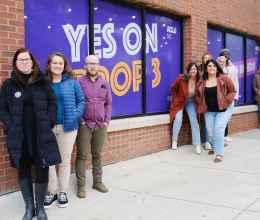
FOR IMMEDIATE RELEASE
DETROIT – Today Flint residents won their lawsuit challenging the Flint City Clerk’s failure to comply with the rights of absentee voters who found that her office was closed and not issuing ballots in a timely manner in the run-up to the August 4 primary election. The clerk has since opened her office for in-person absentee voting, and today’s order, issued by Judge Celeste Bell of Genesee County Circuit Court, requires her to keep her office open for in-person voting and to issue absentee ballots by mail within 24 hours of receiving requests.
Plaintiffs in this case, Barkey et al. v Brown et al. filed in Genesee County Circuit Court, are registered Flint voters had been unable to vote early in person at their local clerk’s office by absentee ballot, or had requested their absentee ballots but had not yet received them in the mail before the August 4 Primary Election. Michigan voters overwhelmingly passed Proposal 3 in 2018, which creates a statewide constitutional right to absentee voting. It guarantees Michigan voters the right to vote absentee during the 40 days before an election, either at home by mail or in person, including at their local clerk's office.
Dan Korobkin, ACLU of Michigan legal director, has this reaction to today’s order:
“Today’s ruling sends the right message loud and clear: clerks must protect every citizen’s sacred right to vote. Thanks to Proposal 3, that includes the right to vote by absentee ballot during the 40 days before an election, and the choice whether to request and cast their absentee ballot by mail or in person at their local clerk’s office. Today’s ruling is a victory for democracy in the city of Flint, where all voters have a right to make their voice heard.”
In addition to Korobkin, the Flint residents are represented by ACLU of Michigan cooperating attorneys Muna Jondy and Alec Gibbs and Shankar Duraiswamy, Sarah Suwanda, and Corey Walker of Covington & Burling LLP.

